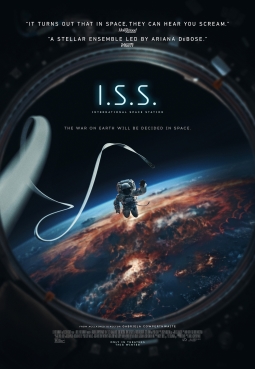
“The International Space Station is a symbol of Russian American cooperation,” reads the opening text to Gabriela Cowperthwaite’s latest film, simply titled “I.S.S.” Unfortunately, it seems like little cooperation took place throughout the film’s production.
Elevated by a well-known cast, with Ariana DeBose, Chris Messina, John Gallagher, Marsha Mashkova, Costa Ronin and Pilou Asbækas, “I.S.S.” focuses on a group of Russian and American astronauts stranded on the International Space Station when a nuclear war breaks out on Earth. With communications lost with the ground, the commanders of both groups receive orders to “take control of the ISS, at all costs.”
What follows is a slow, predictable, and honestly, rather boring story of treachery and murder, ladened with poor suspense and two-dimensional characters. Friction begins to develop between the various occupants (unrealistically, there are only six; three Americans, three Russians) and they begin fighting. New arrival, American Kira Foster, attempts to maintain peaceful relationships, to no avail; one by one, the astronauts begin to kill each other. The film ends with Foster and the only surviving Russian cosmonaut (Alexey Pulov, played by Pilou Asbækas) boarding the Soyuz spacecraft and returning to Earth.
What I found bothered me most about this film was that there was little to no character development and the characters themselves were flat, two-dimensional, and forgettable. There was one character, Russian cosmonaut Weronika Vetrov, who had some degree of a developed personality; and she was killed in the first forty minutes. The rest were boring, generic, and followed heavily archetypical tropes: newbie arrival, just learning the ropes, narcissistic, controlling commander, worried father, just trying to make sure his children are okay and enraged patriot.
The plot itself is slow and predictable. As I said before, it follows rising tensions between the Russian cosmonauts and American astronauts on the International Space Station, with a little bit of suspense and the ever-present threat of crashing to the surface (which we are reminded of very, very often) looming over them. Nothing in this film took me by surprise, and honestly, I found it to be quite boring, with long lapses of dull, forced emotion interrupted by short bursts of vigorous fighting or sudden plot development.
However, the visual effects were phenomenal. The views of scorched Earth from the space station and the depictions of the station itself (especially during the few scenes actually in space, like American commander Gordon Barrett’s ill-fated spacewalk) were genuinely well-done.
I found the concept itself to be very interesting. I think it’s interesting to see the miniature stories that can develop on the sidelines of a major event, and it’s something that is severely underrepresented in media; films like Steven Spielburg’s 2005 “War of the Worlds” and Roland Emmerich’s 1996 “Independence Day” do this well. There was potential for this to be an engaging, riveting film and if the idea is ever touched upon again, I think it could be met with considerably more success.
